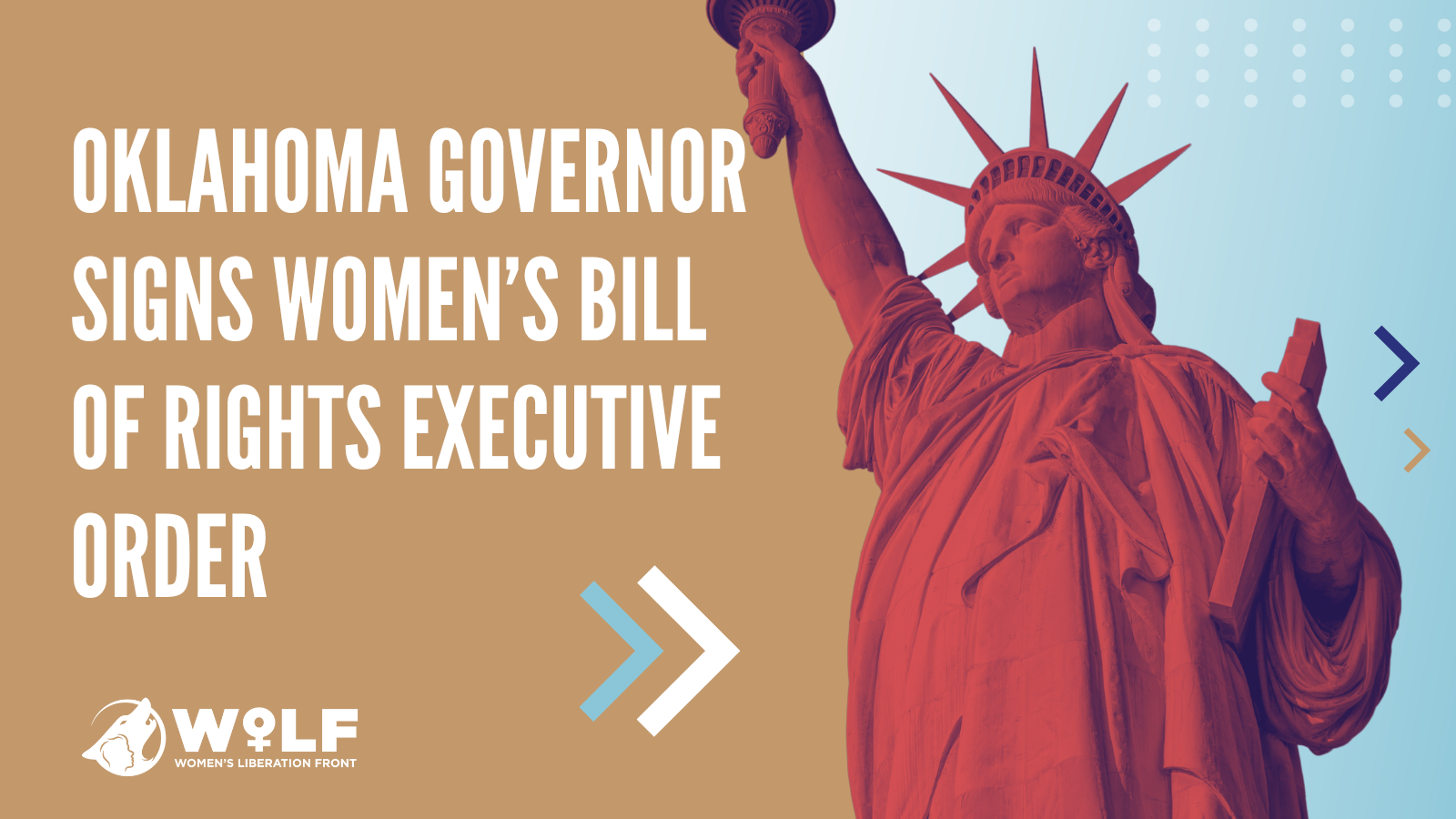Women’s Bill of Rights Introduced in More States: WoLF Testifies in Kansas
Historic model legislation by WoLF & IWV inspires bills in more states and new Congressional resolutions
ADVANCING THE WOMEN’S BILL OF RIGHTS
Lauren Bone, Legal Counsel for WoLF, recently spoke at a hearing on Kansas Senate Bill 180 (SB180), which would enshrine the Women’s Bill of Rights in the state. Kansas is the second state to propose the model legislation following Oklahoma (SB408 & HB1449). More state legislatures are poised to introduce the Women’s Bill of Rights.
On Thursday, February 23, the Kansas Senate passed SB180 - 26 “yea” to ten “nay,” with four abstaining. The Kansas House of Representatives must pass a companion bill before it proceeds to the desk of Kansas’ Governor Laura Kelly - at the time of publication, one had not yet been introduced.
The Women’s Bill of Rights protects single-sex spaces from overreach by unelected bureaucrats by ensuring that “sex” in state and federal law is interpreted based on biology rather than gender identity. It also allows sex-separated spaces and opportunities such as prisons, domestic violence shelters, athletic competitions, and restrooms to remain in place by enshrining the application of “intermediate scrutiny” to cases of sex discrimination, which is the current standard already applied to sex by the US Supreme Court.
“[The Women’s Bill of Rights] is needed to preserve vital statistics because without properly tracking criminal statistics by sex, instead of “gender identity,” Biden’s Bureau of Prisons would not have learned this year that “transgender status” in men’s correctional facilities is correlated with [a] heightened risk of perpetration of sexual assault against other men.”
TESTIMONY TO THE KANSAS SENATE COMMITTEE
In a hearing hosted by the Kansas Senate Public Health and Welfare Committee, Riley Gaines, a nationally ranked female swimmer, testified about her experience being forced to compete against a male.
“My teammates and I were forced to compete against a biological male named Lia Thomas,” she said. Gaines detailed:
Thomas was allowed to compete in the women’s division after competing as a member of University of Pennsylvania’s men’s swim team for three years where at best was ranked 462nd in the men’s category. We watched in dismay as Thomas swam to a national title in the 500 freestyle, beating out the most impressive and accomplished female swimmers in the country, including Olympians and American record holders.
Gaines also testified that she and her teammates were forced to share intimate spaces like locker rooms with Thomas, and that her complaints to the NCAA were ignored. “SB180 is a declaration that words matter, that biology matters, and that science matters, and that when it comes to privacy and safety, separating the sexes is not only Constitutional, it’s common sense,” she testified.
The Women’s Bill of Rights was co-written by WoLF and Independent Women's Voices (IWV), who worked together in partnership on the model legislation. Jennifer Braceras, Director of the Independent Women’s Law Center, also spoke at the hearing.
“The redefinition of sex-based words has the potential to rewrite thousands of state and federal laws that use words like ‘woman,’ ‘man,’ ‘male,’ and ‘female,’” Braceras testified. “Decoupling these words from biology changes the meaning of all of these laws already on the books opening up women’s spaces and opportunities to biological men who identify as women or girls.”
Speaking on behalf of WoLF, Lauren Bone described the importance of tracking sex for statistical data in areas like criminal justice, where safety and lives are at risk when the government is forced to operate in a sex-blind manner.
“Recognition of sex is foundational to ensuring equal access to public life,” she said. “This is needed to preserve vital statistics because without properly tracking criminal statistics by sex, instead of “gender identity,” Biden’s Bureau of Prisons would not have learned this year that “transgender status” in men’s correctional facilities is correlated with [a] heightened risk of perpetration of sexual assault against other men.”
WATCH THE FULL HEARING
Transactivists also attended the hearing, testifying against the Women’s Bill of Rights.
“The truth is, there can never be a level playing field,” said Taryn Jones, a lobbyist for Equality Kansas. “My cousin is six feet tall; she’s a cisgender female. Should she not be allowed to play on a women’s basketball team because she has an advantage?”
Reverend Carolene Dean, a female pastor who testified against the bill, claimed that “There is no professional opportunity that I lose, no spaces I wouldn’t be willing to share with a trans woman.”
It’s unclear, based on her testimony, if Reverend Dean has ever been unfortunate enough to find herself in a domestic violence shelter, rape crisis counseling, or a women’s prison — all spaces which many states have now opened up to men, exposing vulnerable women (who are disproportionately women of color and LGB) to increased risk of further violence and harassment.
When asked by Senator Mike Thompson how many genders there were for Kansas to accommodate, Reverend Dean replied: “There are as many genders as there are beautiful creations in the world.”
BACKGROUND ON THIS HISTORIC MODEL LEGISLATION
On March 31, 2022, during Women’s History Month, the Women’s Liberation Front (WoLF) and Independent Women’s Voice (IWV) introduced the Women’s Bill of Rights to clearly define “sex” on biology, codify the intermediate scrutiny standard to recognize sex when relevant, and enshrine into law common definitions of “woman,” “girl,” and “mother.”
Transactivists have relied on muddying language and retroactively legislating, replacing “sex” with “gender.” Radical feminists argue that this is a form of pernicious gaslighting that erases the historical and contemporary oppression and discrimination against members of the female sex: women and girls.
For example, the Biden administration has repeatedly twisted the language of Title IX - the groundbreaking 1972 bipartisan legislation passed to ensure educational equity for women and girls.
If passed, the Women’s Bill of Rights would ensure that laws using words like “woman,” “girl,” or “mother” would not be re-interpreted with fringe definitions of the words to include men and boys who “feel like” women, girls, or mothers. Instead, transgender activists must explain precisely why they aim to pass laws and policies that roll back sex-based rights in favor of protecting “gender.”
Lauren Bone, WoLF Legal Counsel, and Jennifer C. Braceras, Independent Women’s Law Center, explained how this collaborative model legislation came about:
That’s why [Women’s Liberation Front and Independent Women’s Law Center] have joined forces to create a Women’s Bill of Rights, model legislation that would codify the common understanding of the words “female,” “woman” and “sex.”
The Women’s Bill of Rights does not create special rights for women. It doesn’t replace the Bill of Rights to our Constitution or create any entitlements. It simply clarifies the meaning of current sex-based laws and codifies longstanding precedent regarding single-sex spaces.
On May 19, 2022, Representatives Debbie Lesko (R-AZ), Jim Banks (R-IN), Diana Harshbarger (R-TN), Claudia Tenney (R-NY), Mary Miller (R-IL), and Vicky Hartzler (R-MO) presented a modified version of the Women's Bill of Rights as a resolution to the House of Representatives and Senate. On February 9, 2023, these resolutions were re-introduced in both houses of Congress (H.Res.115 & S.Res.53).
Your Voice Matters!
Even though the fight for the rights of women and girls is ongoing, it is not yet won; we need your help. The Women’s Bill of Rights tells lawmakers that women and girls are not “identities” worn by people who choose to “identify as oppressed” but people who are marginalized by society on the basis of sex.
WoLF stands in solidarity with lesbians (exclusively same-sex attracted human females), safeguards children and youth who do not conform to sex stereotypes, and rejects the notion that men could ever be lesbians via “gender identity.” If you are interested in helping us further our mission, there are plenty of opportunities to get involved.
When their constituents speak up, lawmakers listen. The button below makes it easy to contact your representatives and tell them you support the Women’s Bill of Rights!










HB 405 Codifies Sex Definitions and Protects Women’s Spaces